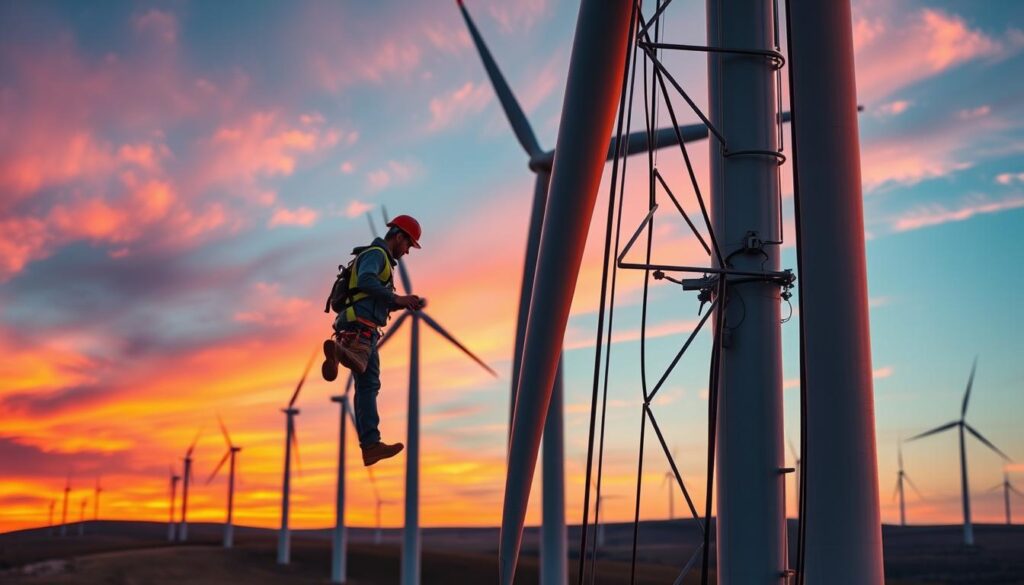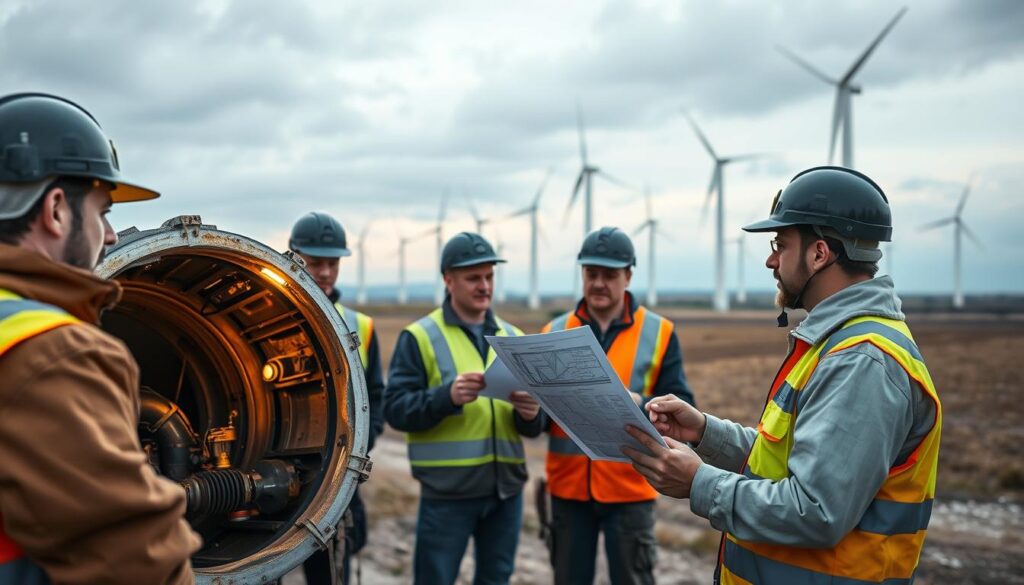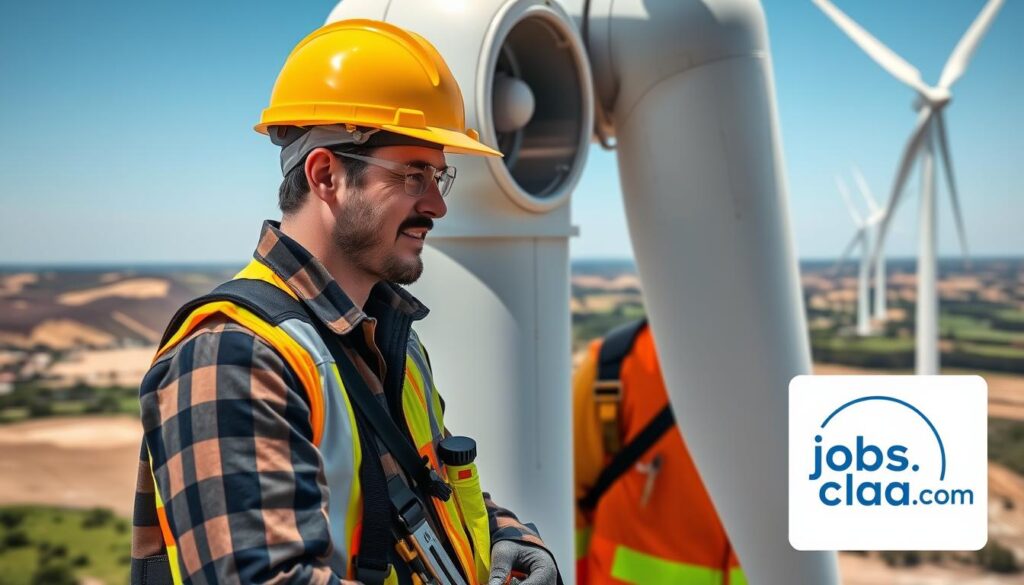Are you looking for a rewarding and in-demand career? Consider becoming a wind turbine technician, a profession that’s experiencing rapid growth. According to the Bureau of Labor Statistics (BLS), this field is projected to grow faster than average through 2033.
This blue-collar job offers excellent job prospects and a chance to work in a field that’s making a difference in the world. As the demand for renewable energy continues to rise, the need for skilled technicians to install and maintain wind turbines is on the increase.
Key Takeaways
- Wind turbine technician careers are projected to grow faster than average.
- This blue-collar job offers excellent job prospects.
- Skilled technicians are needed to install and maintain wind turbines.
- The demand for renewable energy is driving growth in this field.
- Wind turbine technicians can expect a rewarding career.
The Rise of Wind Energy in America
The rise of wind energy in America is transforming the country’s energy landscape. As the nation shifts towards renewable energy sources, wind power is playing an increasingly vital role. This transition is driven by the need for sustainable and clean energy solutions.
Current State of Wind Power in the US
Wind energy has become a significant contributor to America’s power grid. According to recent data, wind power accounts for a substantial percentage of the country’s electricity generation. This growth is a result of technological advancements and investments in wind energy infrastructure.
Growth Projections for the Next Decade
Projections indicate that wind energy will continue to grow at a rapid pace over the next decade. Factors such as decreasing technology costs and increasing demand for clean energy are driving this growth. As a result, wind energy is expected to become an even more integral part of America’s energy mix.
Impact on the Job Market
The expansion of wind energy has significant implications for the job market. The industry is creating new opportunities for employment, particularly for wind turbine technicians. The following table illustrates the growth projections for wind turbine technician jobs:
| Year | Employment Numbers | Growth Rate |
|---|---|---|
| 2020 | 30,000 | 5% |
| 2025 | 45,000 | 7% |
| 2030 | 60,000 | 10% |
As the wind energy sector continues to expand, it is likely to have a positive impact on the job market, creating more opportunities for wind turbine technicians and other related professions.
What Does a Wind Turbine Technician Do?
If you’re considering a career as a wind turbine technician, you’re likely curious about the day-to-day responsibilities of the job. As a wind turbine technician, you’ll be responsible for ensuring that wind turbines operate efficiently and effectively, which involves a range of tasks from maintenance to repairs.
Day-to-Day Responsibilities
Your daily tasks may include:
- Conducting routine maintenance checks on turbine components
- Troubleshooting issues with electrical and mechanical systems
- Performing repairs or replacements as needed
- Climbing turbines for inspections and maintenance
Work Environment and Conditions
Wind turbine technicians work in a variety of settings, including onshore and offshore wind farms. The job often requires working at heights and in varying weather conditions, from extreme cold to heat.
Physical Demands of the Job
The role is physically demanding, requiring technicians to climb tall turbines, lift heavy equipment, and work in confined spaces. Physical stamina and a good level of fitness are essential for this career.
Technicians must also be comfortable with heights and have the ability to work in a fast-paced, dynamic environment.
Wind Turbine Technician Careers: The Fastest Growing Blue-Collar Opportunity
The demand for wind turbine technicians is skyrocketing, making it one of the fastest-growing blue-collar jobs in the US. According to the Bureau of Labor Statistics (BLS), wind turbine technicians are projected to see much faster than average growth through 2033.
Growth Rate Compared to Other Trades
The BLS projects faster-than-average growth for electricians, plumbers, and wind turbine technicians through 2033. Wind turbine technicians, however, are expected to see a particularly significant surge, with a growth rate that’s considerably higher than many other trades.

Factors Driving Industry Expansion
Several factors are driving the expansion of the wind energy industry. The increasing demand for renewable energy sources, government incentives, and technological advancements are all contributing to the rapid growth of this sector.
Regional Job Hotspots
Regional job hotspots for wind turbine technicians include areas with significant wind energy infrastructure, such as Texas, Iowa, and Oklahoma. These states offer numerous job opportunities due to their large wind farms and ongoing projects.
Educational Requirements and Training Paths
The path to becoming a wind turbine technician involves a combination of formal education and hands-on training. To succeed in this field, you’ll need to acquire specific skills and knowledge through various educational programs.
Technical School Programs
Technical schools offer specialized programs in wind turbine technology, providing students with the foundational knowledge required for this career. These programs typically cover topics such as electrical systems, mechanical principles, and safety procedures.
Community College Options
Community colleges often provide associate degree programs or certificates in wind energy technology. These programs can be a great option for those looking for a more comprehensive education, including both theoretical and practical training.
Apprenticeship Opportunities
Apprenticeships offer hands-on experience and the chance to work under the guidance of experienced technicians. This practical training is invaluable for preparing you for the demands of the job.
Finding Legitimate Apprenticeships
To find a legitimate apprenticeship, look for programs sponsored by reputable companies or industry associations. For instance, companies like DEWALT offer scholarships to students pursuing trades as part of their $30 million Grow the Trades initiative.
What to Expect During Training
During your training, you can expect a mix of classroom instruction and hands-on practice. You’ll learn about safety protocols, equipment maintenance, and troubleshooting techniques, preparing you for a successful career as a wind turbine technician.
Essential Skills for Success in the Field
As a wind turbine technician, you’ll need to develop a range of skills to succeed in this challenging yet rewarding career. The job requires a unique blend of technical knowledge, physical ability, and soft skills.
Technical Aptitudes
You’ll need a strong foundation in mechanical and electrical systems, as well as knowledge of hydraulic and pneumatic systems. Familiarity with computerized maintenance management systems is also beneficial. Key technical skills include:
- Understanding of electrical circuits and electronics
- Knowledge of mechanical systems and components
- Familiarity with troubleshooting techniques
Physical Abilities
Wind turbine technicians must be physically fit to climb tall turbines and work at heights. Good physical stamina and the ability to lift heavy equipment are essential. You’ll also need to be comfortable working in confined spaces and varying weather conditions.
Problem-Solving and Communication Skills
Effective problem-solving skills are crucial for diagnosing and repairing complex issues with wind turbines. You’ll also need to communicate clearly with your team, reporting on maintenance activities and any issues encountered.
Safety Consciousness
Safety is paramount in this role. You must be aware of potential hazards and follow strict safety protocols to prevent accidents. This includes wearing personal protective equipment (PPE) and adhering to lockout/tagout procedures.
Step-by-Step Guide to Becoming a Wind Turbine Technician
If you’re considering a career in wind energy, understanding the path to becoming a wind turbine technician is essential. This guide will walk you through the necessary steps to pursue this rewarding career.
Step 1: Research and Prepare (High School Focus)
Starting in high school, you can begin preparing for a career as a wind turbine technician. Focus on subjects like mathematics, science, and vocational training. Understanding the basics of electrical and mechanical systems will be beneficial.
Step 2: Complete Your Education
After high school, enroll in a technical program or community college that offers courses in wind turbine technology or a related field. VIKOR provides specialized training for its Tower Technicians, and similar programs can offer valuable hands-on experience.

Step 3: Gain Hands-On Experience
Hands-on experience is crucial in this field. Look for internships, apprenticeships, or entry-level positions that allow you to work directly with wind turbines. This practical experience will make you a more competitive candidate.
Step 4: Obtain Necessary Certifications
Certifications, such as those offered by OSHA, can significantly enhance your job prospects. Research the specific certifications required by employers in your region and obtain them to stand out in the job market.
Step 5: Apply for Entry-Level Positions
With your education and certifications in place, you’re ready to apply for entry-level positions. Tailor your resume to highlight relevant coursework, training, and any hands-on experience you’ve gained. Be prepared for a rigorous interview process, as employers seek candidates who are both knowledgeable and safety-conscious.
By following these steps, you can set yourself on the path to a successful career as a wind turbine technician. Advancement opportunities are available for those who are committed to their professional development.
Tools and Equipment You’ll Need to Master
As a wind turbine technician, you’ll need to familiarize yourself with a variety of tools and equipment to perform your job effectively. Your work will involve a combination of safety gear, hand and power tools, diagnostic technology, and climbing equipment.
Safety Equipment
Safety should always be your top priority. You’ll need to use personal protective equipment (PPE) such as:
- Hard hats
- Safety glasses
- Hearing protection
- Fall protection gear
- Steel-toed boots
Hand and Power Tools
You’ll use a range of hand and power tools, including:
- Wrenches and sockets
- Pliers and punches
- Drills and impact drivers
- Screwdrivers and nut drivers
Diagnostic Technology
Modern wind turbines rely on sophisticated diagnostic technology. You’ll need to be familiar with:
- SCADA systems
- Vibration analysis tools
- Thermographic cameras
- Ultrasonic testing equipment
Climbing Gear
Climbing is a significant part of a wind turbine technician’s job. You’ll need to use:
- Climbing harnesses
- Climbing ropes and ladders
- Fall arrest systems
- Personal fall limiters
By mastering these tools and equipment, you’ll be well-prepared to tackle the challenges of your role and contribute to the growing wind energy sector.
Certifications and Safety Training
To succeed in their roles, wind turbine technicians must prioritize certifications and safety training. The wind energy sector is rapidly evolving, and the demand for skilled technicians who can work safely and efficiently is high.
OSHA Requirements
The Occupational Safety and Health Administration (OSHA) sets strict standards for worker safety in the wind energy industry. Technicians must undergo specific training to comply with OSHA regulations, including understanding hazard communication and lockout/tagout procedures.
Industry-Specific Certifications
Beyond OSHA requirements, industry-specific certifications can enhance a technician’s career prospects. Organizations like the Global Wind Organisation (GWO) offer certifications that cover technical and safety aspects of wind turbine maintenance.
First Aid and Rescue Training
First aid and rescue training are critical for wind turbine technicians, who often work at heights and in remote locations. Technicians must be prepared to respond to emergencies effectively.
Continuing Education Opportunities
The wind energy sector is constantly evolving, making continuing education crucial. Technicians should seek out ongoing training and certification opportunities to stay current with the latest technologies and safety protocols.
Salary Expectations and Benefits
The financial rewards of being a wind turbine technician are significant, with competitive salaries and comprehensive benefits. As you explore this career path, understanding the compensation structure is essential.
Average Pay Scales by Region
Salaries for wind turbine technicians can vary by region, depending on factors like the cost of living and the concentration of wind farms. For instance, technicians in the Great Plains region, where many wind farms are located, may earn salaries on the higher end of the scale.
Entry-Level vs. Experienced Compensation
Entry-level wind turbine technicians can expect a competitive starting salary. According to industry data, companies like VIKOR offer entry-level Tower Technicians an average of more than $70,000 in their first year, with the potential to earn over $95,000 in their second year. Experienced technicians can earn even higher salaries, reflecting their expertise and the value they bring to their employers.

Benefits Packages
Wind turbine technicians typically receive comprehensive benefits packages, including health insurance, retirement plans, and paid time off. These benefits contribute to the overall attractiveness of the career.
Overtime and Travel Compensation
Overtime is common in this field, especially during peak maintenance periods, and is usually compensated at a higher rate. Additionally, technicians may receive travel compensation for work-related trips, which can include accommodations and meal allowances.
Overall, the combination of competitive salaries, benefits, and opportunities for overtime provides a financially rewarding career path for wind turbine technicians.
Finding Job Opportunities in the Wind Energy Sector
With the growth of wind energy, the demand for skilled wind turbine technicians is on the rise. As the industry continues to expand, job seekers can explore various avenues to secure employment.
Major Employers in the Industry
Companies like VIKOR specialize in commercial tower construction, maintenance, and service work for the wind energy industry. Other major employers include leading wind farm developers and maintenance service providers. Researching these companies and their current job openings can be a good starting point.
Networking Strategies
Networking plays a crucial role in finding job opportunities. Attend industry conferences, join professional associations, and connect with current wind turbine technicians to build your network. Utilize platforms like LinkedIn to expand your professional connections.
Online Job Resources
Utilize online job boards and career websites specific to the renewable energy sector. Popular job search platforms and company career pages are valuable resources for finding wind energy job listings.
Interview Preparation Tips
To succeed in an interview, prepare by researching the company, practicing common interview questions, and highlighting your relevant skills and experience. Show enthusiasm for the industry and demonstrate your knowledge of wind turbine technology.
By combining these strategies, you can effectively find and secure job opportunities in the wind energy sector.
Career Advancement Opportunities
As you progress in your wind turbine technician career, you’ll discover numerous opportunities for advancement. With experience, you can move into specialized roles, take on leadership positions, or transition into related fields. The wind energy industry is rapidly growing, creating a demand for skilled professionals who can take on new challenges.
Specialist Roles
You can specialize in areas such as turbine maintenance, electrical systems, or control systems. These specialist roles often require additional training or certifications but can lead to higher pay and greater job satisfaction. For instance, you might become an expert in diagnostic technology, helping to improve turbine efficiency and reduce downtime.
Management Positions
Experienced wind turbine technicians can move into management positions, overseeing teams of technicians or managing wind farm operations. These roles involve project management, team leadership, and strategic planning. You might also be responsible for ensuring compliance with safety regulations and industry standards.
Related Career Transitions
Your skills as a wind turbine technician are transferable to other industries, such as construction, electrical contracting, or industrial maintenance. You might also consider transitioning into roles like wind farm development or energy consulting. These careers leverage your knowledge of the wind energy sector while offering new challenges.
Entrepreneurial Opportunities
Some wind turbine technicians choose to start their own businesses, offering services such as turbine maintenance, inspection services, or training programs. Entrepreneurship allows you to be your own boss and capitalize on the growing demand for wind energy services. You can also explore opportunities in renewable energy consulting or sustainable energy solutions.
Conclusion: Is a Wind Turbine Technician Career Right for You?
As the wind energy sector continues to grow, becoming a wind turbine technician can be a rewarding and challenging career choice. With the industry’s expansion, you’ll have opportunities for job security, competitive pay, and a chance to work in a field that’s making a positive impact on the environment.
If you’re considering a wind turbine technician career, ask yourself: Are you comfortable with heights and physical labor? Do you have a strong mechanical aptitude and problem-solving skills? Are you willing to invest in the necessary education and training? If you answered yes, this could be the career for you.
With the right training and certifications, you can embark on a fulfilling career as a wind turbine technician. You can explore the various educational paths, job opportunities, and career advancement options discussed in this article to determine if this profession aligns with your goals and aspirations.
Ultimately, a career as a wind turbine technician offers a unique blend of technical challenges, outdoor work, and contribution to renewable energy. By understanding the requirements and opportunities in this field, you can make an informed decision about whether this career choice is right for you.